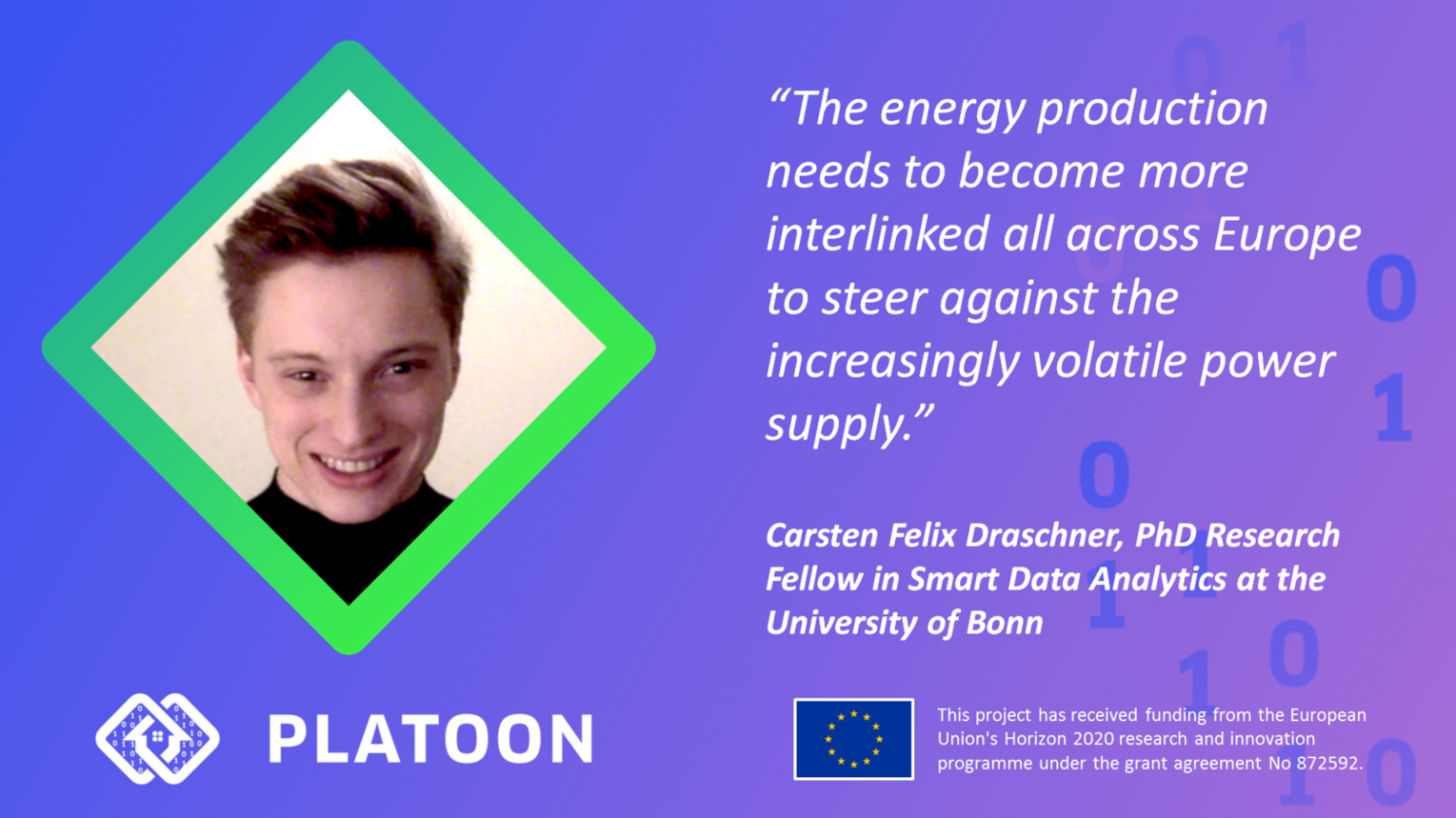
Carsten Felix Draschner is a PhD Research Fellow at the University of Bonn in Smart Data Analytics since 2020. He is working in the group ‘Distributed Semantics Analytics’ that deals with distributed analytics, machine learning, and big data. He did his Bachelors and Masters in Computer Science with the focus on Intelligent Systems. He worked for the Research Institute for Discrete Mathematics Bonn, Federal Financial Supervisory Authority of Germany and as Data Scientist in a Cologne AI Startup.
Carsten, what is your organisation’s role in PLATOON?
The University of Bonn provides its expertise in data science, machine learning, distributed computing and Big Data platform development to PLATOON. We will be developing the PLATOON platform that instantiates the components such as the analytics dashboard, IDS and data harmonisation for efficient creation and execution of large scale analytics pipeline for energy optimisation tasks.
How does PLATOON relate with you and your team’s background and interests?
This large European project offers data-driven solutions for an applicable change of energy infrastructure steering to renewable and sustainable energy production and use. Multiple challenges occur in this process where gained data can be used to optimize those processes. The Smart Data Analytics Group of the University of Bonn has experience in handling large semantic data, processing it in a distributive manner and offering numerous insights from these.
How will PLATOON digitalise and contribute to the development of the energy sector (e.g. with big data, edge computing and AI) in your opinion?
PLATOON will show what further problem areas can be resolved by use of data. This will help a large number of stakeholders to follow the path to the transformation to a more sustainable energy production and use.
Which stakeholder groups can benefit from PLATOON?
The energy sector will get a reference architecture for data usage which covers multiple use cases. Also, the research and development departments get further opportunities to originate newly developed technologies for already existing applications. In general, PLATOON has the chance to be a good example on how a successful European project should look like, where a multitude of different people from various organizations can work together, in order to make the use of renewable energy more applicable. When applied, this would lead to a greener footprint of our continent.
How do you expect the energy sector to be like in the future?
The energy sector will completely switch to renewable energy sources. I could imagine that we will have a multitude of bigger energy production companies, smaller villages which have an ownership of their local energy production and that more and more houses will produce their own energy and can sell it if they produce more than they need. The energy production needs to become more interlinked all across Europe to steer against the increasingly volatile power supply. A mixture of power-to-gas along with other energy storage opportunities can fill in these gaps as well. We need to solve the problems of unstable production, energy storage and infrastructure building. The opportunity of smaller villages working against local power plants and power infrastructure slows down the transformation process. This is why we need to develop acceptance there. Europe has to be regarded as one integrated system, having in mind that we don’t work on a blank sheet.
Which are the most significant challenges and opportunities related to the digitalisation of the energy sector in your opinion?
A secure storage of standardized continuous data streams would help to optimise energy efficiency and to overcome other challenges. It would also help to have an open source standard as key reference software architecture instead of having multiple proprietary systems.
What are your expectations of the PLATOON project?
I want to bring in my passion for research and development in cutting edge technology for data analytics. I’m curious to see the application of our technologies in an important European project. I can commit to this project, because I would love to see an increase of sustainability by optimizing the use of renewable energy sources. The European cooperation gives me the opportunity to bring myself in a multicultural and multinational project. During the PLATOON project, I’ll work on my PhD where I combine the research in the Smart Data Analytics Research Group with their application in the real world Problems of PLATOON.
Thank you, Carsten, for this interesting interview!